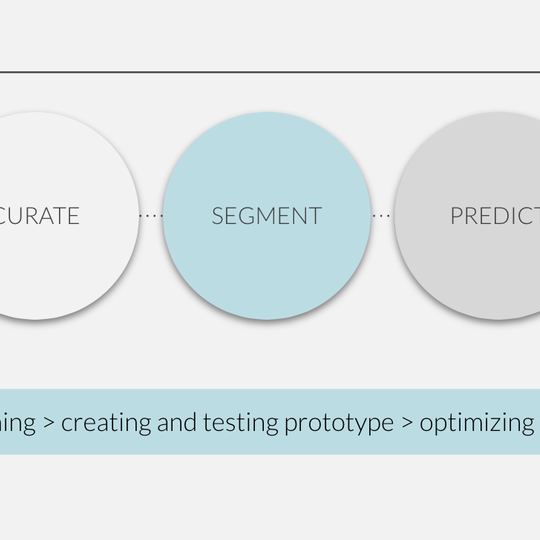
The Changing Landscape of Marketing
The landscape of marketing has experienced seismic shifts in the last decade. [B]RIGHT Brand Performance Group will help you understand what has changed and how to turn those challenges into opportunities.
Brands are at a major inflection point: Establish a brand positioning with a clear foundation based on a unique place in the market and figure out a nuanced way to attack that vertical, multi-channel, and with channel precision ... OR … Harness data to develop strategies to be more efficient and effective.
Most brands choose neither and continue the path of least resistance (eschewing change) and continue down the path of diminishing returns on their way to brand obscurity and market obsoletion.
The solution to this dilemma is not one that can be solved by traditional marketing or status quo strategies. You have to be bold to pursue big opportunities.
The first step is to ask yourself: "what data do we have and what can I do with it?"
If you don't know the answer to those questions, we're here to answer both.
Implementing a data strategy begets efficiencies, efficiencies create increased margins, increased margins create higher profitability, higher profitability creates happy owners/brands, and happy owners/brands create: Economically sustainable, future-proof, and dynamic brands.
After you reach out to us (by email or phone) we will send you a project intake form to fill out. This 5 minute form will set the foundation for the next step.
We will schedule a discovery call where we identify your business problem and gather information (and assets needed to quote the project).
We will develop a solutions-deck with Scope of Work (SOW) for project.
We will review our SOW together, you will ask questions, and finally, you will sign-off on project.
We will begin the work.
Organizing, exploring, curating, and synthesizing data into actionable reports, charts, visualization with the focus of identifying efficiencies and growth opportunities through large data sets.
Use cases:
Developing statistical models with a goal of accurate prediction. We typically use machine learning techniques such as extreme gradient boosting, random forest, or penalized regression, which sacrifice a quantified impact of each variable in order to achieve greater predictive accuracy.
Use cases:
Taking information we know about a small population (e.g. attitudes or perceptions from a survey), we can develop distinct subgroups and use the information known about the full population to assign each member to its appropriate subgroup.
Use cases:
Using historical KPIs and other metadata to predict future performance.
Use cases:
Developing statistical models with a goal of explaining the impact of variables. When the point is to quantify the specific impact of each variable of an outcome, we are limited to certain types of regression analysis, but are able to explicitly understand the magnitude of the impact of each variable.
Use cases:
Supervised, and unsupervised, methods for dividing a population into homogeneous groups, typically when data is available on the full population.
Use cases:

Data analysis is the process of collecting, organizing, and examining data to extract valuable insights. In the context of brands and marketing, data analysis involves analyzing consumer behavior, marketing campaign performance, and other key metrics to gain a deeper understanding of the market and target audience. With the right tools and techniques, brands and marketers can identify patterns, trends, and relationships in the data that can help inform their decisions.
Synthesis is the process of combining different elements of data to create a unified picture. In the context of brands and marketing, synthesis involves taking all the data gathered from various sources and combining it into a single view. This allows brands and marketers to gain a more comprehensive understanding of their target audience and how their marketing efforts are impacting the market.
Modeling is the process of creating a representation of a real-world system or process using mathematical or computational tools. In the context of brands and marketing, modeling involves creating predictive models to forecast future trends, sales, or consumer behavior. These models can help brands and marketers make informed decisions about their marketing strategies, product development, and budget allocation.
By analyzing data and synthesizing insights, brands and marketers can gain a deeper understanding of their target audience, including their behaviors, preferences, and motivations.
Data analysis, synthesis, and modeling allow brands and marketers to make data-driven decisions, rather than relying on intuition or gut instincts.
By using data to optimize their marketing strategies, brands and marketers can increase the return on investment for their marketing spend.
By using data to inform their budget and resource allocation decisions, brands and marketers can ensure that they are making the most efficient use of their resources.
Data analysis, synthesis, and modeling are critical components of a successful marketing strategy. By using these tools and techniques, brands and marketers can gain a deeper understanding of their target audience, make data-driven decisions, and achieve better results from their marketing efforts.

The landscape of marketing has experienced seismic shifts in the last decade. [B]RIGHT Brand Performance Group will help you understand what has changed and how to turn those challenges into opportunities.

[B]RIGHT’s marketing research strategy is founded in identifying opportunities for whatever problems your brand needs solved. We implement the research strategy you need, with a focus on simplifying your data strategy.

Data analytics and statistical modeling for marketers, agencies and brands that want to be more data-driven, efficient and effective.